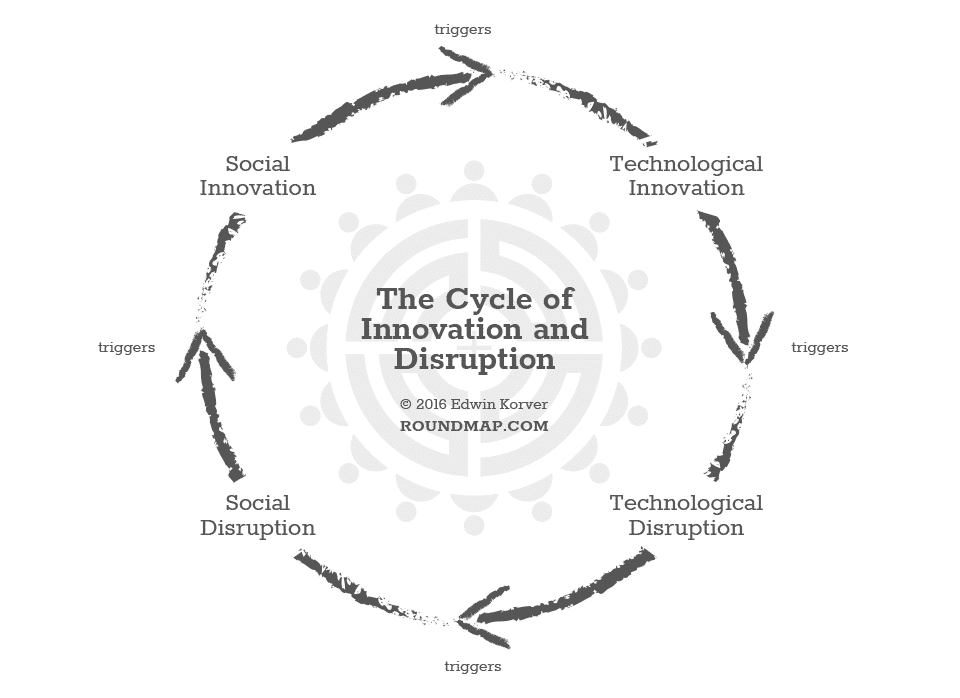Artificial Intelligence (AI) has firmly entered the stage of technological disruption. It is no longer a distant promise—it is transforming industries, workflows, and even the way we think. From automating tasks to generating content, AI is adding tremendous value. But alongside the opportunities, research reveals some sobering side-effects: people are thinking less for themselves, entry-level jobs are disappearing, and a generation risks being deprived of essential skill-building opportunities.
This raises a profound question: Are we becoming AI-powered—or AI-povered? With just one letter of difference, the implications couldn’t be greater.
The Cycle of Innovation and Disruption
At RoundMap, we often return to a principle we call the Cycle of Innovation and Disruption. It works like this:
Technological Innovation sparks new tools, methods, and systems.
These advances inevitably cause Technological Disruption, changing industries and markets at their core.
Disruption spills over into society, triggering Social Disruption—layoffs, bankruptcies, inequality, or cultural upheaval.
From that turmoil, we search for Social Innovation, new ways of working and living that align society with technological progress.
AI is squarely in the technological disruption phase today. Businesses that fail to embrace it risk obsolescence. But the deeper effect is just beginning: mass layoffs, workforce dislocation, and educational challenges that strike at the very fabric of society.

The Social Disruption Ahead
History shows us that no technological disruption is without pain. The printing press displaced scribes. The industrial revolution put artisans out of work. Automation in manufacturing led to factory closures and labor unrest.
With AI, the disruption will cut across every knowledge-based profession: law, journalism, education, design, even software development itself. The youngest generation—those entering the workforce—may face the hardest impact, as traditional entry-level positions vanish. Without these stepping stones, how will they gain the skills, experience, and confidence to thrive?
We are approaching a period of social disruption that may feel overwhelming:
Widespread job losses in white-collar sectors
Economic instability for families and communities
Erosion of human agency as thinking is increasingly outsourced to machines
A potential trust crisis, as AI blurs the line between fact and fabrication
The Path Forward: Social Innovation
And yet, this disruption is not the end of the story. It is a necessary stage in the cycle. Painful as it may be, it creates the conditions for social innovation—rethinking education, reimagining work, and redefining value creation.
We must begin asking:
How can we redesign education to focus less on rote skills and more on critical thinking, creativity, and adaptability?
What new social contracts or safety nets are needed to protect those displaced?
How can we leverage AI not to replace human potential but to amplify it?
Can we shift from a scarcity mindset to one of shared value, where technology benefits the many rather than the few?
AI disruption is not just a technological story—it is a societal inflection point. If we respond wisely, we can emerge stronger, more equitable, and better aligned with the potential of this transformative technology.
The question remains: Will AI make us truly powered—or leave us impoverished? The answer lies not in the technology itself, but in how we adapt socially, culturally, and systemically to its disruptive force.
Author
-
Edwin Korver is a polymath celebrated for his mastery of systems thinking and integral philosophy, particularly in intricate business transformations. His company, CROSS/SILO, embodies his unwavering belief in the interdependence of stakeholders and the pivotal role of value creation in fostering growth, complemented by the power of storytelling to convey that value. Edwin pioneered the RoundMap®, an all-encompassing business framework. He envisions a future where business harmonizes profit with compassion, common sense, and EQuitability, a vision he explores further in his forthcoming book, "Leading from the Whole."
View all posts Creator of RoundMap® | CEO, CROSS-SILO.COM





